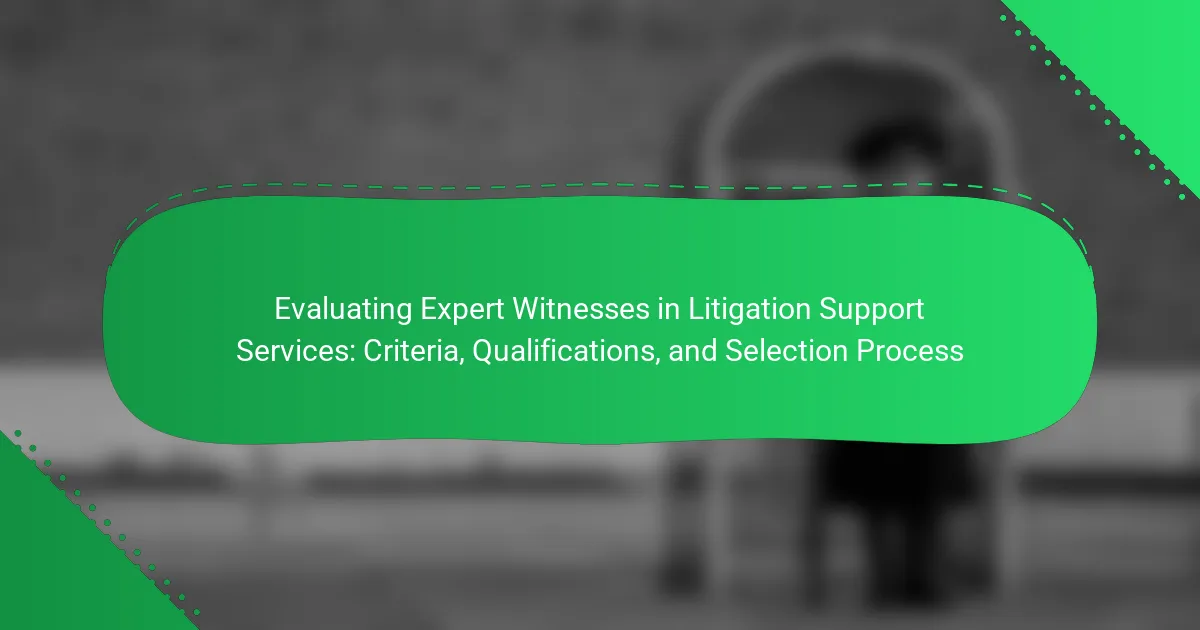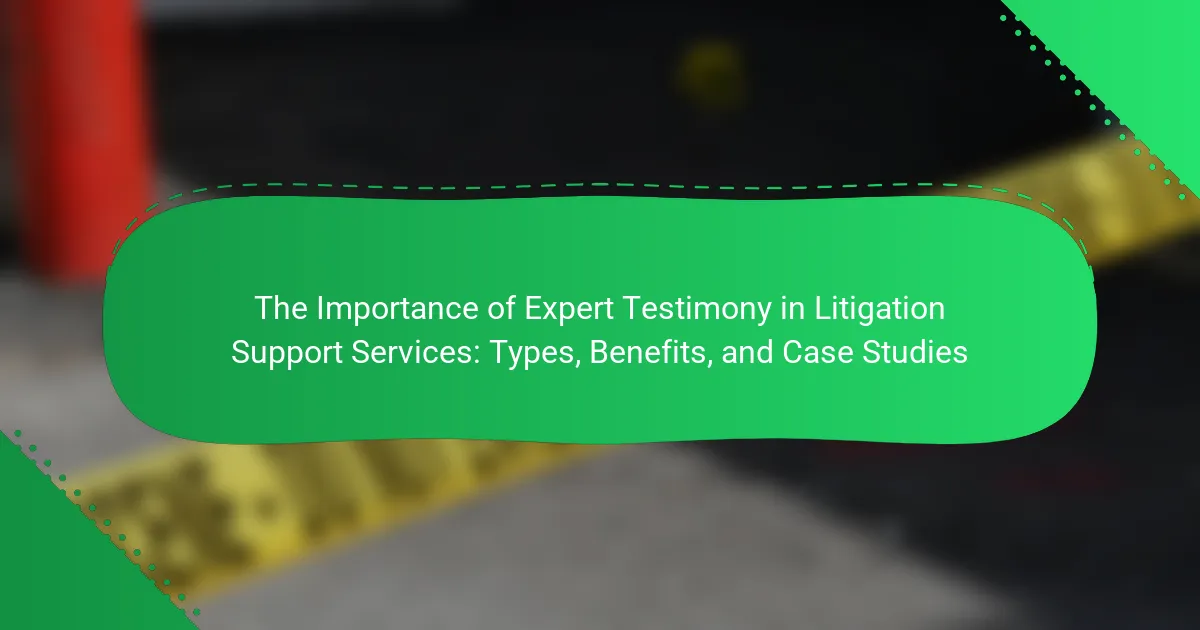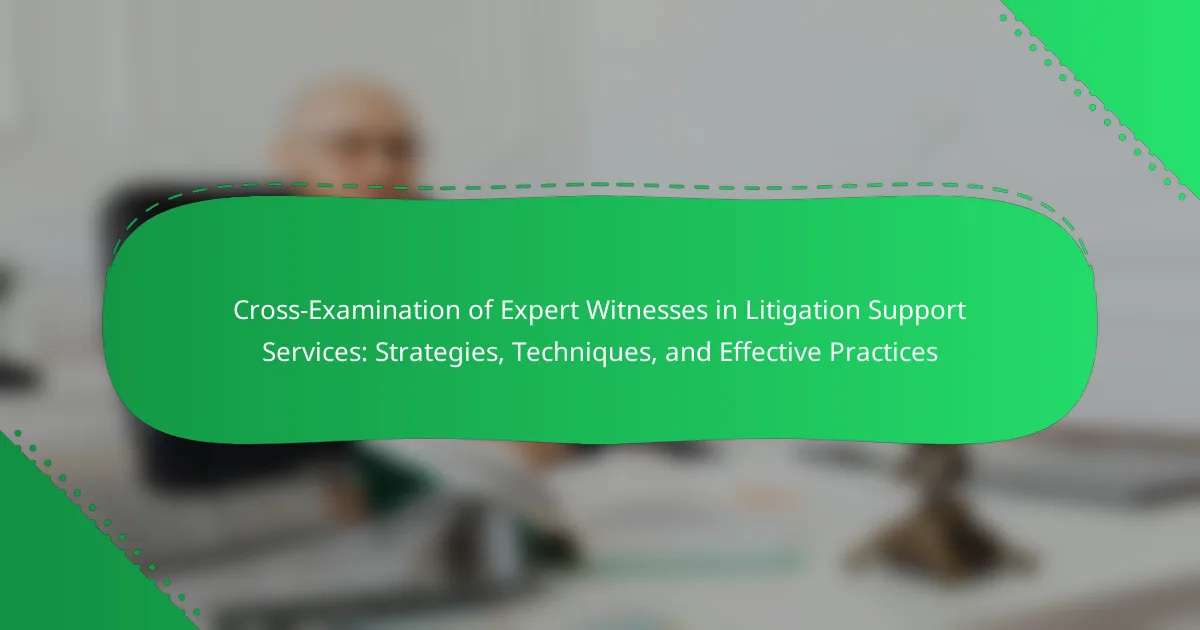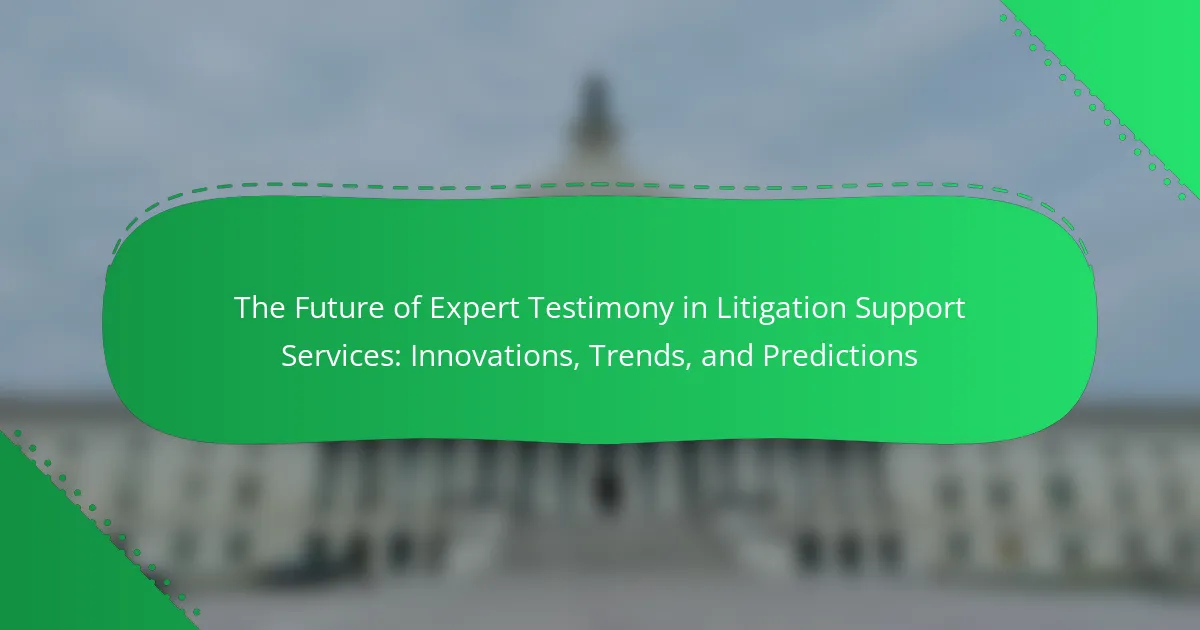Expert witnesses in litigation support services are professionals with specialized knowledge pertinent to legal cases. They provide expert opinions, analysis, and testimony that assist courts in understanding complex evidence from various fields such as medicine, engineering, and finance. The article outlines the criteria and qualifications necessary for expert witnesses, emphasizing the systematic selection process that attorneys follow to ensure credibility and relevance. It also details best practices for collaborating with expert witnesses, including effective communication, thorough preparation, and maintaining confidentiality, all of which contribute to successful litigation outcomes.
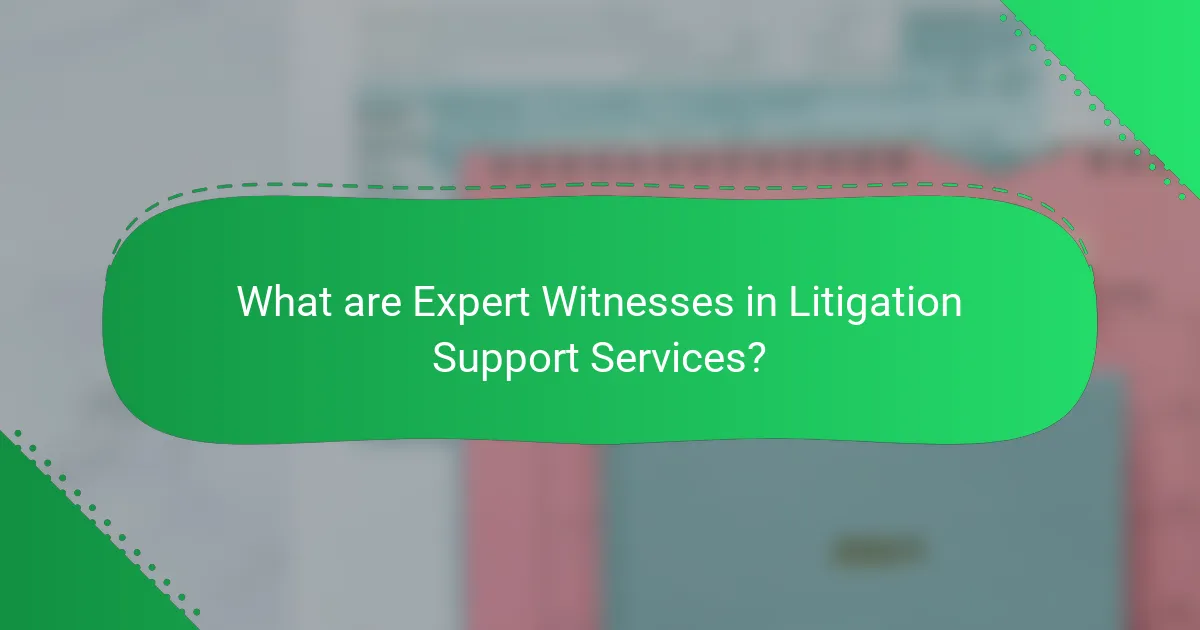
What are Expert Witnesses in Litigation Support Services?
Expert witnesses in litigation support services are individuals with specialized knowledge relevant to a legal case. They provide expert opinions, analysis, and testimony based on their expertise. This expertise can come from various fields, including medicine, engineering, finance, and more. Their role is to assist the court in understanding complex evidence or technical details. Expert witnesses must often meet specific qualifications and criteria to be deemed credible. They may be required to have advanced degrees or significant professional experience. Their testimony can significantly influence the outcome of a case. Courts rely on their insights to make informed decisions based on factual and expert analysis.
How do Expert Witnesses contribute to legal cases?
Expert witnesses contribute to legal cases by providing specialized knowledge and opinions relevant to the case. Their expertise helps clarify complex issues for judges and juries. Expert witnesses can offer testimony based on their qualifications and experience in a specific field. This testimony can influence the outcome of a case by supporting a party’s claims or defenses. In many instances, expert witnesses prepare reports that summarize their findings and opinions. These reports serve as critical evidence in legal proceedings. Their insights can also help attorneys develop strategies for presenting their cases. Expert witnesses are often called upon in fields such as medicine, engineering, and finance. Their contributions are essential for ensuring that decisions are based on accurate and reliable information.
What roles do Expert Witnesses play in litigation?
Expert witnesses provide specialized knowledge in litigation. They assist in explaining complex technical issues to judges and juries. Their testimony can clarify evidence and help establish facts. Expert witnesses are often called to provide opinions based on their expertise. This can influence the outcome of a case significantly. They may also assist in the preparation of legal documents and case strategy. Their credibility is essential, as it can affect the weight of their testimony. Courts rely on expert witnesses to ensure informed decision-making in legal proceedings.
How do Expert Witnesses impact case outcomes?
Expert witnesses significantly influence case outcomes by providing specialized knowledge to the court. Their testimony can clarify complex issues for judges and juries. This clarity often sways the decision-making process. Research indicates that cases with expert witness testimony have higher success rates. For example, a study found that expert witnesses improved case outcomes by up to 30%. Their credibility and qualifications enhance the persuasiveness of the arguments presented. Additionally, expert witnesses can help establish the standard of care in professional negligence cases. Their insights can also reveal critical facts that may not be apparent to legal professionals. Thus, the impact of expert witnesses on case outcomes is profound and measurable.
What criteria are used to evaluate Expert Witnesses?
Expert witnesses are evaluated based on several key criteria. These criteria include qualifications, experience, and credibility. Qualifications refer to the expert’s educational background and relevant certifications. Experience encompasses the number of cases the expert has worked on and their familiarity with the subject matter. Credibility involves the expert’s reputation within their field and their ability to communicate effectively. Additionally, the expert’s objectivity and reliability in providing unbiased opinions are critical. Courts often assess these factors to determine the expert’s suitability for a case.
What qualifications should an Expert Witness possess?
An Expert Witness should possess specialized knowledge, education, and experience in their field. This includes advanced degrees relevant to their expertise. Practical experience in the industry is also critical. They must demonstrate a strong understanding of the subject matter. Excellent communication skills are essential for conveying complex information clearly. Additionally, they should have a proven track record of providing expert testimony in legal settings. Familiarity with legal procedures and standards is necessary. These qualifications ensure the expert can effectively assist in litigation.
How does experience influence the effectiveness of an Expert Witness?
Experience significantly enhances the effectiveness of an Expert Witness. It allows the witness to draw from a wealth of knowledge and practical applications. Experienced witnesses can provide more credible and persuasive testimony. Their familiarity with courtroom procedures contributes to smoother presentations. They can anticipate opposing arguments and prepare effective counterpoints. Additionally, seasoned experts often have established reputations, which can influence juror perceptions. Studies show that jurors tend to trust witnesses with extensive experience in their field. Thus, experience directly correlates with the perceived reliability and authority of the Expert Witness.
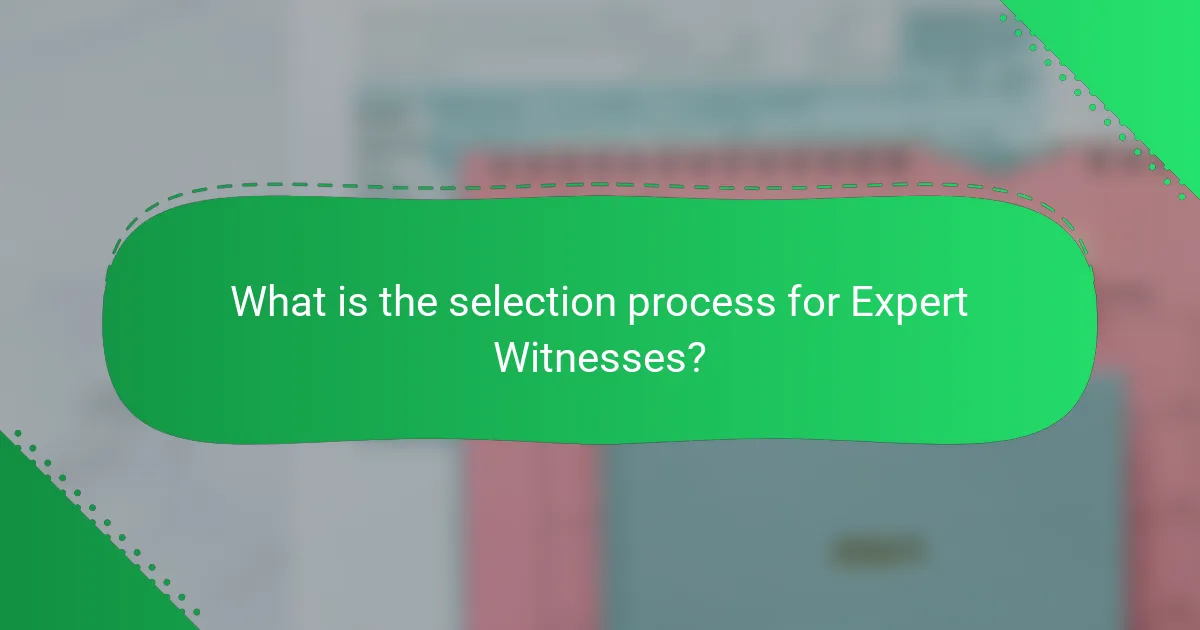
What is the selection process for Expert Witnesses?
The selection process for expert witnesses involves several key steps. Initially, attorneys identify the specific expertise required for the case. They then compile a list of potential candidates based on qualifications and experience. Next, they conduct interviews to assess the candidates’ communication skills and ability to explain complex concepts. Following this, they review each candidate’s credentials, including education, publications, and prior testimony. Reference checks are also performed to validate the candidates’ reputations and reliability. Finally, the attorney selects the expert witness who best fits the case requirements and can effectively support the litigation strategy. This systematic approach ensures that the chosen expert witness possesses the necessary qualifications and can provide credible testimony in court.
How do legal teams identify potential Expert Witnesses?
Legal teams identify potential expert witnesses through a systematic process. They begin by evaluating the specific needs of the case. This includes understanding the legal issues involved and the type of expertise required. Legal teams often conduct research to find professionals with relevant qualifications and experience. They may consult databases, professional associations, or referrals from trusted sources. Additionally, they review the expert’s publications, past testimonies, and overall reputation in their field. This thorough vetting ensures the selected expert can effectively communicate complex information to a jury. Ultimately, the goal is to find an expert who can enhance the case’s credibility and support the legal arguments presented.
What resources are available for finding qualified Expert Witnesses?
Online directories and databases are available for finding qualified expert witnesses. Websites like ExpertPages and SEAK provide comprehensive listings. Professional associations also maintain directories of experts in specific fields. Legal firms often have access to internal databases and networks. Consulting firms can recommend experts based on their experience. Additionally, social media platforms like LinkedIn can be useful for identifying professionals. Referrals from attorneys or colleagues can lead to qualified candidates. Researching published works in relevant fields can also help locate experts with specific expertise.
How can legal teams assess the credibility of Expert Witness candidates?
Legal teams can assess the credibility of Expert Witness candidates by examining their qualifications and experience. They should review the candidate’s educational background, professional certifications, and relevant work history. Verifying previous testimonies and publications can also provide insight into their expertise. Additionally, legal teams should conduct interviews to evaluate communication skills and confidence. Checking references from past cases can further validate the candidate’s credibility. Researching any disciplinary actions or negative reviews is essential to ensure reliability. These steps help ensure that the Expert Witness can provide accurate, reliable testimony in court.
What factors should be considered during the selection process?
The selection process for expert witnesses should consider qualifications, experience, credibility, and communication skills. Qualifications include relevant educational background and certifications. Experience refers to the expert’s practical involvement in the field. Credibility is assessed through reputation and past performance in similar cases. Communication skills are vital for conveying complex information clearly. Each factor directly impacts the effectiveness of the expert in litigation. Research indicates that an expert’s ability to communicate effectively can influence jury perception (Katz, 2018, “The Role of Expert Witnesses in Litigation,” Journal of Legal Studies).
How does the subject matter expertise of an Expert Witness affect selection?
The subject matter expertise of an Expert Witness significantly impacts the selection process. Expertise ensures the witness possesses in-depth knowledge relevant to the case. This knowledge enhances the credibility of the testimony provided. Legal teams often prioritize candidates with specialized skills or qualifications. For instance, a medical malpractice case requires a witness with medical credentials. Courts tend to favor expert opinions that are scientifically validated. According to a study by the American Bar Association, expert credibility directly influences jury perception. Therefore, subject matter expertise is crucial for effective litigation outcomes.
What role does communication skill play in selecting an Expert Witness?
Communication skills are crucial in selecting an Expert Witness. Effective communication ensures that the expert can convey complex information clearly. This clarity is vital during court proceedings where juries and judges must understand the testimony. An expert who communicates well can simplify technical jargon into layman’s terms. This ability enhances credibility and persuasiveness in legal contexts. Additionally, strong communication skills facilitate better collaboration with attorneys. They can help in preparing the case and formulating strategies. Studies indicate that jurors are more likely to trust experts who articulate their insights effectively. Thus, communication skills significantly impact the overall effectiveness of an Expert Witness in litigation.
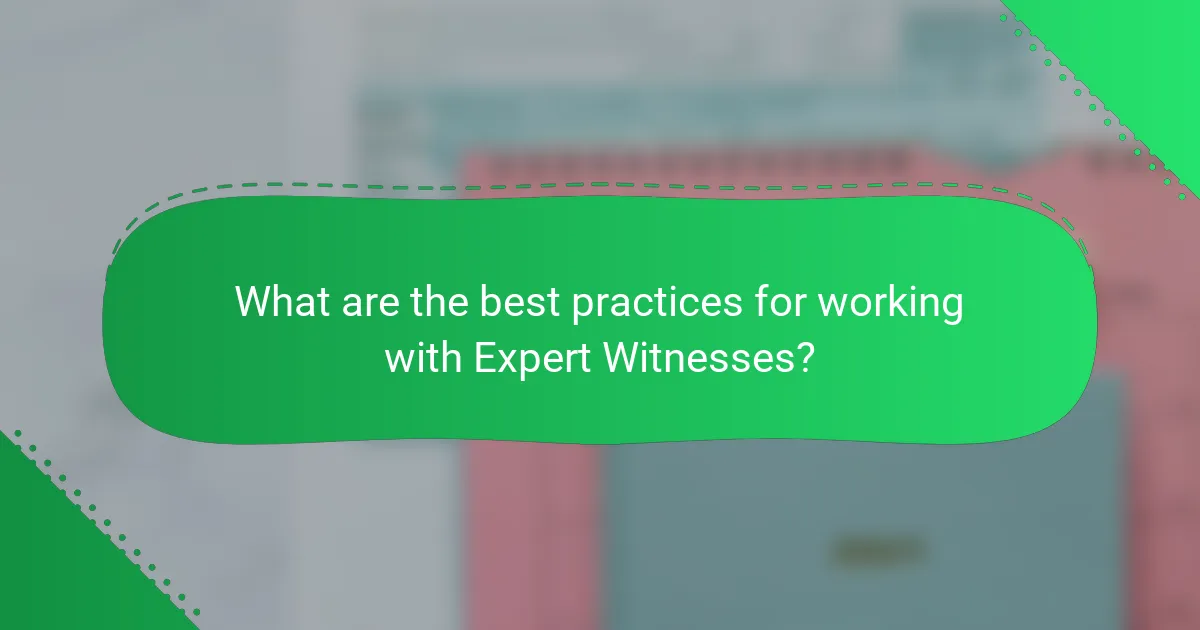
What are the best practices for working with Expert Witnesses?
Best practices for working with expert witnesses include clear communication, thorough preparation, and understanding their role. Establishing clear expectations helps align objectives. Preparing the expert with case details enhances their effectiveness. Understanding the expert’s qualifications ensures they are credible and relevant. Engaging in regular updates maintains alignment throughout the process. Respecting the expert’s time fosters a positive working relationship. Finally, ensuring confidentiality protects sensitive information. These practices lead to more effective testimony and better outcomes in litigation.
How can legal teams effectively collaborate with Expert Witnesses?
Legal teams can effectively collaborate with expert witnesses by establishing clear communication channels. Regular meetings should be scheduled to discuss case details and expectations. Legal teams must provide comprehensive case materials to expert witnesses for informed opinions. Setting deadlines for deliverables helps maintain project timelines. Feedback should be constructive and timely to enhance the expert’s contributions. Training sessions on legal processes can improve the expert’s understanding of courtroom dynamics. Collaborative tools can facilitate document sharing and updates. These practices enhance the synergy between legal teams and expert witnesses, leading to better case outcomes.
What strategies can enhance the effectiveness of Expert Witness testimonies?
Effective strategies for enhancing Expert Witness testimonies include thorough preparation and clear communication. Expert Witnesses should understand the case details and the legal context. They must also be able to explain complex concepts in simple terms. Utilizing visual aids can help clarify their points. Practicing direct examination and cross-examination can improve their delivery. Engaging with attorneys early in the process fosters alignment on key messages. Research shows that well-prepared witnesses are more credible and persuasive. A study by the American Bar Association indicates that effective communication significantly impacts jury perception.
What common challenges arise in the selection and evaluation of Expert Witnesses?
Common challenges in selecting and evaluating expert witnesses include credibility assessment, expertise relevance, and communication skills. Evaluators often struggle to determine an expert’s credibility due to varying qualifications and experience levels. Additionally, ensuring the expert’s expertise aligns with the case specifics is crucial. Misalignment can lead to ineffective testimony. Communication skills are essential for conveying complex ideas clearly to a jury. Evaluators may also face biases, either from personal perceptions or from the expert’s prior cases. Furthermore, the cost associated with hiring top-tier experts can be prohibitive. Lastly, the availability of experts can limit options, especially in niche fields.
How can legal teams mitigate risks associated with Expert Witness selection?
Legal teams can mitigate risks associated with Expert Witness selection by conducting thorough due diligence. This includes verifying the expert’s qualifications, experience, and credibility. Teams should review the expert’s publications and past testimony to assess reliability. Engaging in interviews can help gauge the expert’s communication skills and understanding of the case. Additionally, checking references from previous cases can provide insights into the expert’s performance. Using a structured selection process reduces the likelihood of bias. According to a study by the National Institute of Justice, proper vetting significantly enhances the effectiveness of expert witnesses in legal proceedings.
What are the consequences of poor Expert Witness selection?
Poor expert witness selection can lead to significant negative consequences in legal proceedings. Inaccurate testimony may mislead the judge or jury. This can result in wrongful verdicts or settlements. The credibility of the case can be severely undermined. Additionally, poor selection may increase litigation costs due to prolonged trials. It can also damage the reputation of the legal team involved. Ultimately, it may lead to appeals or retrials, further complicating the legal process. Studies show that expert witnesses who lack relevant experience are often less persuasive in court.
Expert witnesses in litigation support services are specialized individuals who provide expert opinions and testimony based on their knowledge in various fields such as medicine, engineering, and finance. This article evaluates the criteria, qualifications, and selection process for expert witnesses, highlighting their significant impact on legal case outcomes. Key factors discussed include the importance of credibility, experience, and communication skills in the selection process, as well as best practices for collaboration between legal teams and expert witnesses. The article also addresses common challenges and risks associated with expert witness selection, emphasizing the necessity of thorough vetting to ensure effective testimony.
